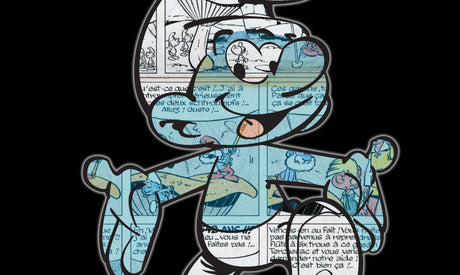What actually happened?
Commodore's history actually begins much earlier in the 50s in New York. Jack didn't sell computers yet, but drove taxis and repaired typewriters between taxi rides.

Brief History of Commodore
• 1956 Jack opens a shop in the Bronx for the repair and sale of typewriters.
• 1956 Jack starts importing typewriters from Europe.
• 1962 Commodore Business Machines is listed on the Montreal Stock Exchange
• 1969 Starts selling calculators.
• 1978 Commodore releases its first home computer (PET)
• 1981 The VIC-20 sequel sells 1 million home computers
• 1983 Commodore 64 becomes the world's best-selling home computer (30 million units)
• 1984 Jack Tramiel leaves Commodore
• 1984 Commodore buys Amiga
• 1987 Amiga 500 is released
• 1994 Commodore goes bankrupt
Jack Tramiel, Commodore's founder was born in Poland and came to the United States as a refugee after World War II. The interest in technology came in part from the US Army where Tramiel learned how to repair and maintain office equipment. After Jack left the military, he opened a shop in the Bronx, New York, specializing in the repair and maintenance of typewriters.
Eventually Jack began importing typewriters from Czechoslovakia which were sold under the name Commodore Portable Typewriter. The typewriter business was profitable until it was out-competed by much cheaper Japanese ditons in the mid-1960s. Commodore and Jack go down for the first time, and Lacking capital, Jack sells shares to Canadian businessman Irving Gould

Japanese and calculators
The money from Gould was used to launch its own mechanical calculator, which is judged to be the next big market now that there has been competition from typewriters. This is initially a success until the Japanese once again out-compete Commodore with a cheaper product.
Beaten twice by the same source, Gould suggested to Tramiel that he travel to Japan to understand why the Japanese can out-compete them all the time with cheaper electronics. Jack did not return with the secret recipe from Japan, but had concluded that the days of mechanical calculators were over and digital display was the future.
Commodore produces a digital calculator with a digital display and electronics from Texas Instruments. Slowly but surely, however, Texas Instruments begins to wake up to the invention and decides to skip Commodore as an intermediary and releases its own calculator.
Again, Jack had a good idea, but was outcompeted and Commodore is in financial trouble for the second time.
Gould saves the Commodore again
By injecting another 3 million dollars into the company, Gould saves Commodore for the second time. The money is used for a takeover of MOS Technology. MOS, like Texas Instruments, was a manufacturer of microchips and will secure Commodore's own chip manufacturing now that Texas Instruments has started with its own calculators. Mo's chief engineer Chuck Peddle is said to have told Tramiel that calculators were a dead end and that computers were the future. Jack challenged Chuck to build a computer and prove the claim.
Commodore's first home computer
All said and done, Commodore releases its first home computer under the acronym PET (Personal Electronic Transactor) in 1978 thanks to Chuck Peddle.
- Commodore PET
Development of the system began in 1976 and was marketed as the first personal computer for the masses. The PET series was discontinued in 1982 after approximately 219,000 units had been sold. Not a mega-success by today's standards, of course, but in 1978 home computers were almost an unknown phenomenon.
- VIC-20
The PET is followed by the VIC-20, which can be said to be the first real home computer. The VIC-20 went on sale in 1981 and sold more than 1 million units in total, which at the time was seen as a success.
- Commodore 64 - The world's best-selling home computer
In 1982, Commodore releases the C-64, which according to the Guinness Book of Records is the C64 the best-selling home computer of all time with total sales of around 30 million units. The Commodore 64 was loved for several reasons. Partly because of its relatively low price and for the time the powerful hardware that was appreciated by both programmers and gaming enthusiasts. Little by little, however, problems began to pile up again for Commodore.
Jack Tramiel was forced out of the CEO position.
Commodore's largest owner fires Tramiel from the CEO position in 1984. Tramiel and Gould have come to blows with each other and Jack has to leave the company on his own. In fact, Jack had already lost control of the company in 1966 when Gould was asked for more money for the second time. Jack Tramiel takes a break from the computer industry but returns as early as 1985 with a buyout of Commodore's competitor Atari. Atari never released a computer that matched the success of the Commodore 64, but enjoyed modest success until the company was sold in 1996.
Commodore and Amiga
Commodore later launched models such as the Commodore Plus/4 and the Commodore 128, but they did not have the same success as the C64. The personal computer market changed rapidly with the introduction of IBM's PC and Apple's Macintosh, which meant that Commodore's products began to be seen as obsolete by the general public.
Commodore's attempt to regain market share with the Amiga series in the 1980s gave some hope, but the wide acceptance of PC computers meant that the Amiga had to fight for its place in the market. Despite the Amiga 500's success as an affordable and loved by gaming enthusiasts, Commodore could not keep up with the rapidly growing PC market.
Financial problems, poor management and weak product launches led to Commodore losing market share. The company struggled with cash flow and failed to deliver new products that could compete with the new technology. Despite attempts to revive the company with products such as the Amiga CD32 and Commodore 65, it was too late.
Commodore was declared bankrupt in 1994. Since then, the brand has changed hands several times both in Europe and the USA. However, the C64 and Amiga still retain a cult following decades after the company stopped making computers.









